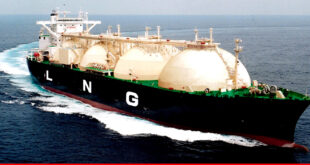Liquefied Natural Gas (LNG) is by far the cheapest imported fuel on which Pakistan can rely to meet its future energy needs. The cost of regasified LNG stands at $9.37 per million British thermal units whereas the imported furnace oil costs $10.62 per mmbtu, high-speed diesel costs $20.03 and liquefied petroleum gas (LPG) costs $17.6.
Natural gas in Pakistan meets 35 percent of power generation needs, 23.8 percent of industrial requirement, 15.6 percent of fertilizer production needs, 5.4 percent requirement of CNG outlets and 18.1 percent of the household fuel consumption. At present, Pakistan faces a gas shortfall of 2 billion cubic feet per day (bcfd) or 33 percent of the total demand. Domestic gas supply is expected to further slow down to 1.5 bcfd in 2030 (from 4 bcfd today) and the demand-supply gap is expected to widen to 7 bcfd over the next 15 years.
This gas shortage is causing an economic loss of up to $1 billion per year to the country, which is forced to import expensive furnace oil, kerosene, LPG and diesel to fulfill energy requirements. This is the reason why the world is turning towards LNG. Global and emerging economies such as China, Korea, Japan, India, Thailand, Indonesia, European Union and Brazil ensure LNG remains part of their energy mix.
Japan imports 80 million tons of LNG per year and India imports 15 million tons. In addition to being cleaner and safer, LNG should be recognized as the fastest solution to ease the burden on Pakistan’s economy.
Pakistan and Qatar inked an agreement for supply of around one billion US dollars worth of Liquefied Natural Gas (LNG) to Pakistan annually to help the country meet its energy shortfall. The agreement on Long Term LNG Sale and Purchase was signed during the visit of Prime Minister Nawaz Sharif’s two-day visit to Qatar.
Pakistan is currently facing a severe shortage of natural gas for its electricity generation and industrial use and estimates put the supply demand gap at around 24 bcfd. The import of LNG from Qatar besides boosting Pakistan Qatar ties would also help Pakistan meet its energy needs.
The LNG from Qatar was being purchased at the best available rates and would help start production of 2000MWs of electricity from power houses that were currently not operational. Qatar would provide around US one billion dollars worth of LNG annually to Pakistan that would meet 20 percent requirements of the country.
The deal would help the country get over of its energy crisis and provide 35 million tons of LNG. It would also help provide gas for the fertilizer factories and domestic users. Under the agreement the two sides can review the price once after the 10th anniversary of the start date. If it fails either party may terminate the SPA with effect from the end of the contract year in which the termination notice was served in which case the supply period can be as short as 11 years the agreement.
The government claims that it had secured a favorable price of Liquefied Natural Gas (LNG) from Qatar for 15 years under an agreement signed in Doha. The price is lower than offered under comparable gas import options. The government confirmed that the difference of port charges of $430,000 per ship would be paid by the Pakistan State Oil, instead of Qatar gas, and would be recovered from consumers through its sale price.
The Qatar Liquefied Gas Company Limited 2 (QG2), which would be supplying LNG to PSO, would pay $320,000 per ship as port charges against actual charges of $750,000. The difference would be picked up by PSO and made part of sale price.
The PSO would be the LNG buyer delivered ex-ship (DES) at 13.37 percent of Brent, while QG2 will be the seller from 2016 to 2031. It said that Qatar gas had previously offered LNG DES price of $6.56 per MMBTU at $40 price of Brent which had now been reduced to $5.35 per MMBTU.
The price agreed for each LNG cargo discharged in a particular month is 13.37 percent of preceding three month average of Brent value.
Annual contract LNG quantity for first year (2016) would be prorate of 2.25 million tons and first quarter of 2017 after which the quantity would be increased to 3.75 million tons per annum beginning second quarter of 2017.
The long-term agreement also provides for annual upward and downward flexibilities of up to three LNG cargoes per contract year.
The government said it had also carried out a price comparison of all long-term gas import options, including previous LNG import attempts at indicative Brent price of $40 per barrel, suggesting that LNG import from Qatar would be the lowest.
Qatar had last offered $6.56 per MMBTU at Brent price of $40 per barrel while the current price is $5.35.
Compared with the natural gas import options, the government claimed the delivery price at border under the Iran-Pakistan gas pipeline was $5.70 per MMBTU at $40 Brent price and that of Turkmenistan-Afghanistan-Pakistan-India was $5.90.
 PAGE Blog Business Weekly Magazine
PAGE Blog Business Weekly Magazine

